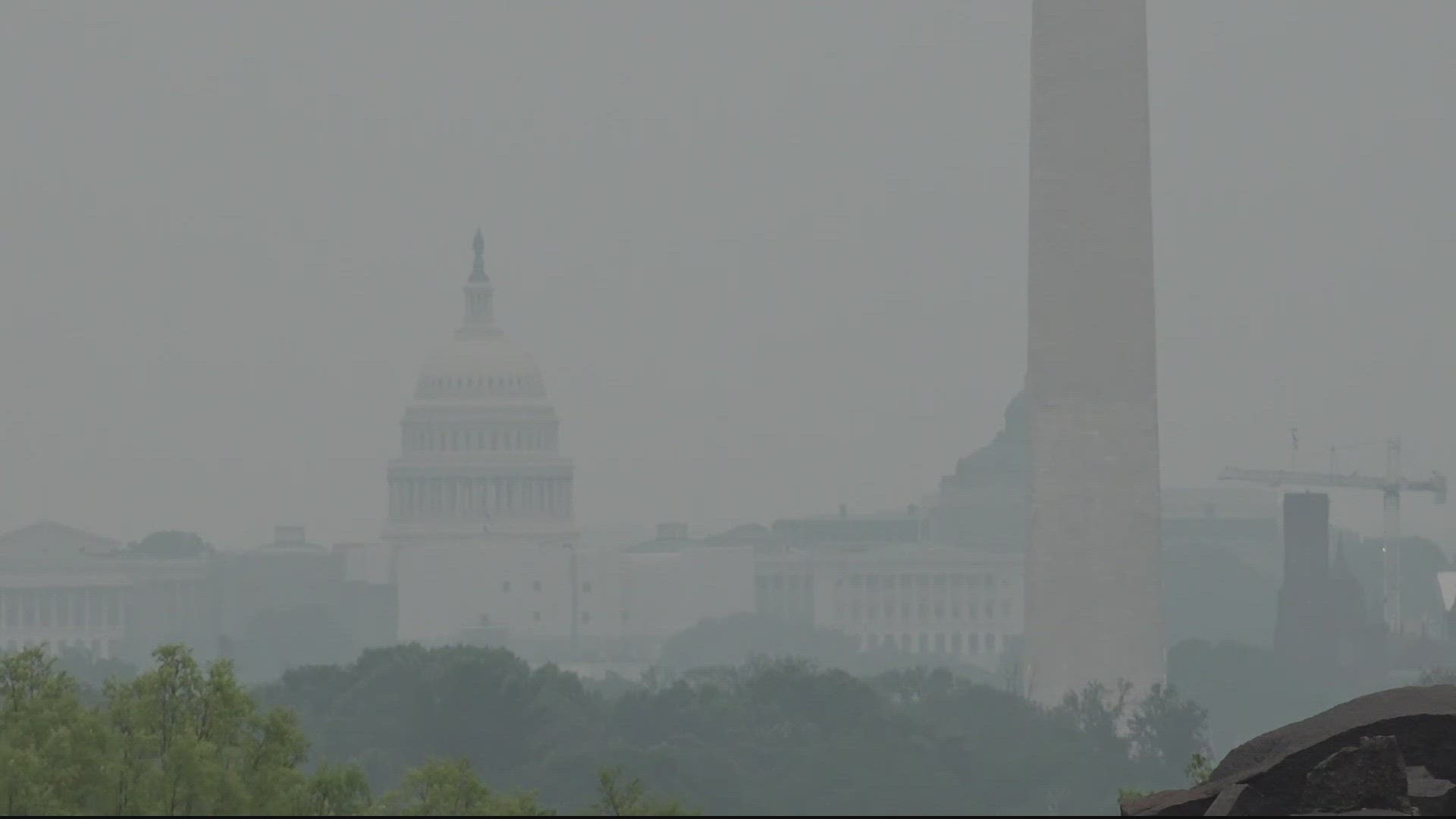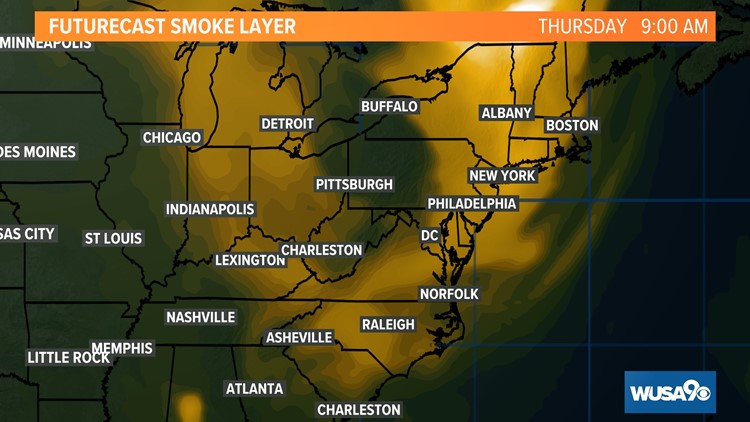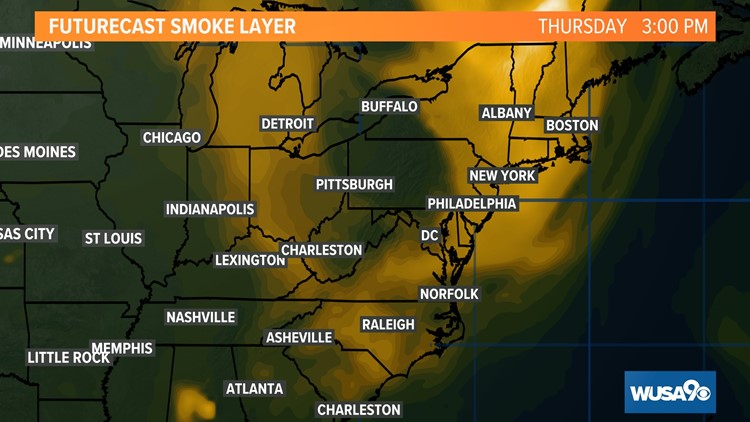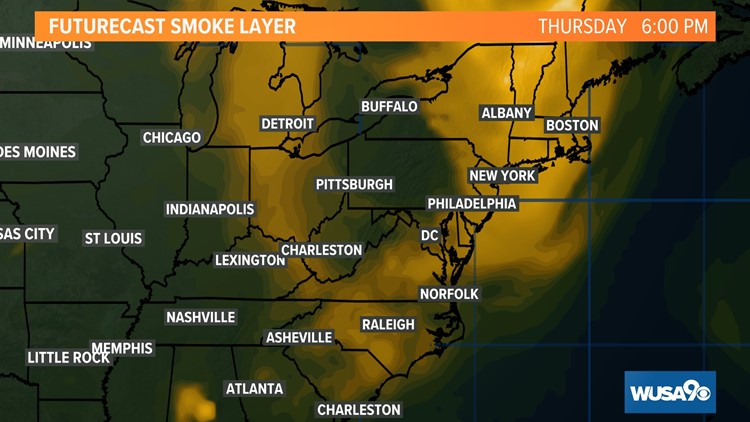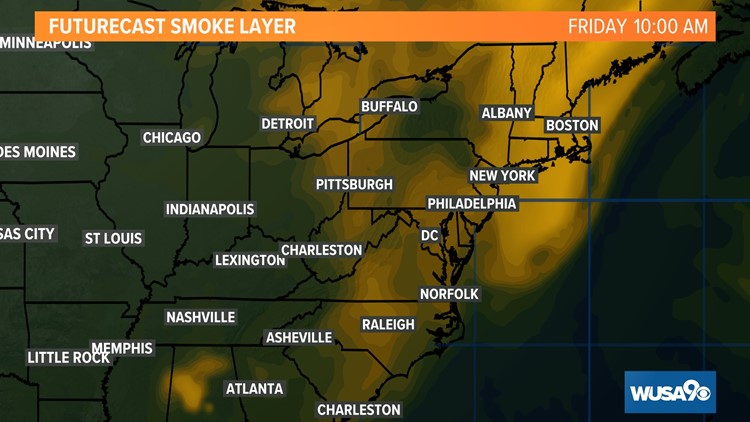WASHINGTON — Canadian wildfire smoke will continue to impact air quality through at least the first half of Thursday. The Environmental Protection Agency’s AirNow.gov site showed D.C. is under a Code Red air quality alert for Thursday.
This level of air quality is considered unhealthy for everyone. Healthy individuals should limit long or intense outdoor activities. Sensitive groups such as people with heart and lung diseases, older adults and children should avoid long or intense outdoor activities.
"It makes it difficult to get around, and I’m an asthmatic - so I need to take care of myself," said Washingtonian Phil Evans. "And there are a lot of people out there with different conditions. So I think it’s a bit of a worry for all of us."
Canadian wildfires will send worsening smoky air across the country and neighboring United States in coming days after recent heavy rains in Quebec missed the places where the fires are most active, officials said Wednesday.

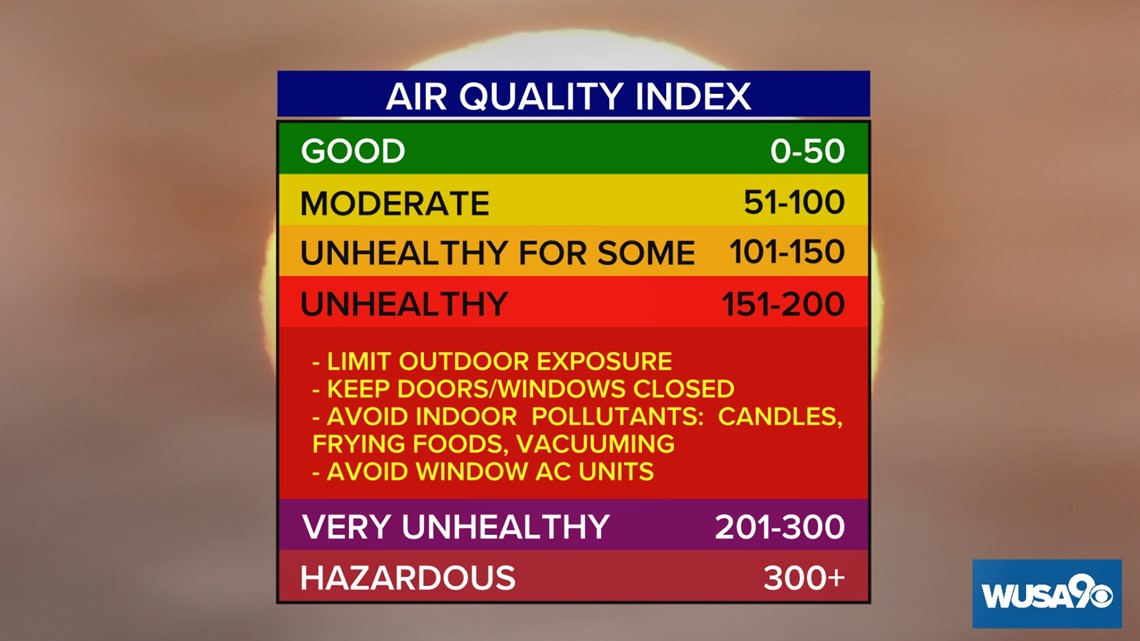
Canadian officials say it is the nation’s worst wildfire season ever and they expect air quality to remain a concern through the summer, as long as the fires continue.
Earlier this month, smoke from wildfires burning in Canada blanketed the northern United States with smoke, turning the air yellowish gray and prompting warnings for people to stay inside. The DMV saw some of the worst air quality levels on record. While Thursday's air quality is not expected to be as bad, the wildfires continue to burn.
Wildfire Smoke Forecast for the end of June
There are 490 fires burning nationally, with 255 of them considered to be out of control. Quebec’s forest fire prevention agency is reporting 110 active fires.
Canada has already surpassed the record for area burned. Nearly every province in Canada has fires burning. A record 30,000 square miles (80,000 square kilometers) of Canada has burned, an area nearly as large as South Carolina, according to the Canadian government.
When will the air quality improve?
We'll notice gradual improvements in the air quality starting Friday. Friday, however, is still forecasted to be a Code Orange air quality day. Winds coming in from a southerly direction will likely reduce the amount of smoke coming in the D.C. Metro area. There's also a chance for showers, which could help improve air quality. Models indicate lingering smoke in the air Saturday, albeit lower levels. Noticeable improvement is in store Sunday.
Health Impacts
Poor air quality can cause myriad health problems, including respiratory issues, lung damage and inflaming illnesses like diabetes, asthma, COPD and heart issues, according to the American Lung Association, The Environmental Protection Agency and The Centers For Disease Control and Protection.
The Heart
Air pollution can contribute to cardiovascular disease. On its website the EPA writes:
"Research by EPA and others has found that exposure to increased concentrations of PM2.5 over a few hours to weeks can trigger cardiovascular disease-related heart attacks and death. Longer-term exposure can lead to increased risk of cardiovascular mortality and decreases in life expectancy."
People with chronic heart disease may experience the following when exposed to air pollution:
- Heart palpitations
- Unusual fatigue
- Lightheadedness
- Shortness of breath
- Chest tightness or pain in the chest, neck or shoulder
The Lung
Tiny air pollutants are inhaled and can make it deep into the lungs where several health problems can occur.
The American Lung Association writes:
"While breathing in larger sizes of particle pollution can be harmful to our health, smaller particles are more dangerous. Bigger particles can irritate your eyes, nose and throat, but our natural defenses help us to cough or sneeze them out of our bodies.
Unfortunately, those defenses don't keep out smaller particles, which get trapped deep in the lungs and can even get into the bloodstream, causing damage to our health."
Research has linked air pollution to lung cancer, asthma attacks and reduced lung function amongst the impacts.
“If you have underlying pulmonary disease, it doesn’t take a lot to trigger what we call an exacerbation of whatever that lung disease is," Dr. Aaron Holley of the Medstar Washington Hospital Center said.
Pregnant Women
Air pollution can bring harm to unborn babies. A study based in California found that air pollution increased the risk of preterm birth and low birth weight.
Older People
As people age, their bodies are not able to fend off the effects of environmental hazards.
A Harvard study found that people aged 65 and older faced a higher risk of premature death from particle pollution, even in places that met current standards for short-term particle pollution.
Children
Children's lungs are still developing and the American Lung Association said it makes them more vulnerable to respiratory infections and air pollution. Kids are also more active when they are outside and breathe in more air.
"They are outside for longer periods and are usually more active when outdoors. Consequently, they inhale more polluted outdoor air than adults typically do," American Lung Association officials said on their website.
Studies have found that children constantly exposed to air pollution may have lungs that don't fully develop or decreased lung function.
Healthy Adults
In most healthy adults air pollution may cause issues such as coughing, itchy eyes and respiratory issues.
A study based out of Galveston, Texas found that healthy adults exposed to air pollution lead to decreased lung volume. The study focused on lifeguards. Experts with the American Lung Association said the study provided evidence of the impact of short-term exposure to particle pollution on healthy, active adults.
"Testing the breathing capacity of these outdoor workers several times a day, researchers found that many lifeguards had reduced lung volume when fine particle levels were high," the agency wrote. "Because of this research, Galveston became the first city in the nation to install an air quality warning flag system on the beach."
The EPA noted that air pollution poses a lower risk for heart disease in normal, healthy adults but there are still some impacts. On its website it says:
"For the population as a whole, however, short -and long-term exposure has been shown to increase hospitalizations for serious cardiovascular events such as coronary syndrome, arrhythmia, heart failure, stroke, and sudden cardiac death, particularly in people with established heart disease."
Sign up for the Get Up DC newsletter: Your forecast. Your commute. Your news.
Sign up for the Capitol Breach email newsletter, delivering the latest breaking news and a roundup of the investigation into the Capitol Riots on January 6, 2021.

